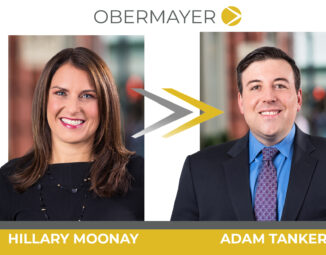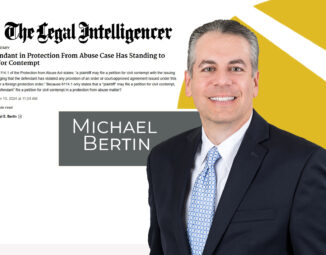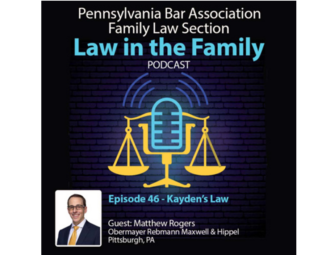Attorney Fees Award in Protection From Abuse Case Reversed
This article was originally posted in The Legal Intelligencer.
The greatest number of cases in Family Court that are filed and litigated throughout the commonwealth, whether in heavily populated cities and counties or rural counties, are protection from abuse cases under the Protection From Abuse Act. Unfortunately, some of these filings are filed for leverage in other aspects of the family law case involving the same parties, or for improper motives, or in bad faith. Consequently, a provision in the PFA Act guards against this by authorizing the award of counsel fees against the filer if he files the PFA petition in bad faith. The recent Pennsylvania Superior Court case of Courtney v. Courtney, 2019 Pa. Super. 50, (Feb. 22) addresses the issue of legal fees in an alleged bad faith filing in a PFA case. Though the Superior Court does not refer to the Courtney case as a case of first impression, the case appears to be such a case.
Under the act, “abuse” is defined, in part, as follows: “the occurrence of one or more of the following acts between family or household members, sexual or intimate partners or persons who share biological parenthood: Attempting to cause or intentionally, knowingly or recklessly causing bodily injury, serious bodily injury, rape, involuntarily deviant sexual intercourse, statutory sexual assault, aggravated indecent assault, indecent assault or incest with or without a deadly weapon; placing another in reasonable fear of imminent serious bodily injury …” Importantly, Section 6117(b) of the PFA Act provides: “Notwithstanding any other provision of law, upon finding that an individual commenced a proceeding under this chapter in bad faith, a court shall direct an individual to pay to the defendant actual damages and reasonable attorney fees. Failure to prove an allegation of abuse by a preponderance of the evidence shall not, by itself, result in a finding of bad faith.”
In the Courtney case, Jennifer Courtney filed a PFA against Scott Courtney. Pursuant to her filing, Jennifer Courtney obtained a temporary PFA order against Scott Courtney. Under the PFA Act, temporary PFA orders are obtained primarily ex parte. Within 10 days after the ex parte order is entered, a hearing is to occur whereby the defendant may defend against the claims and a final order may be entered. In the Courtney case, the temporary PFA order “prohibited him from returning to the shared residence and abusing, harassing, stalking or threatening the appellant and the children.” After subsequent litigation, a custody order was granted and awarded the parties shared legal and physical custody. There was another order entered thereafter prohibiting Jennifer Courtney’s boyfriend from being in the residence during her custodial periods.
At a later date, according to the Superior Court opinion, Jennifer Courtney filed a second PFA petition, “in part due to an incident during a custody exchange.” Part of the allegations contained in the second PFA petition stated: “he demanded access to my home because he believed me boyfriend was present. My boyfriend was not present. I refused to grant the defendant access, so he called the police.”
Thereafter, Scott Courtney notified Jennifer Courtney that he would file an emergency petition for counsel fees alleging that she filed her PFA petition in bad faith. When the parties appeared for the hearing on Jennifer Courtney’s second PFA petition, the parties reached an agreement prior the hearing where Jennifer Courtney withdrew her petition contingent upon the court entering an order directing the parties “inter alia, to exchange custody at the local police department and routinely communicate only by email.” According to the opinion: “the trial court granted [Jennifer Courtney’s] request and entered an order withdrawing her PFA petition and imposing the requested conditions.” Because of the agreement reached by the parties, no evidentiary hearing was conducted on Jennifer Courtney’s second PFA petition. However, on the same day, a hearing was conducted on Scott Courtney’s emergency petition for counsel fees which was related to Jennifer Courtney’s filing of the second PFA petition.
At the hearing on Scott Courtney’s emergency petition for counsel fees, the trial court found that Jennifer Courtney filed her second PFA petition in bad faith because there was no testimony about Scott Courtney’s forcible attempt to enter the home. As reflected in the opinion, “in finding that [Jennifer Courtney] had filed the PFA in bad faith, the trial court concluded that [Jennifer Courtney’s] ‘vague allegations of psychological abuse do not rise to the level of a valid PFA’ so I do find that the PFA was filed in bad faith.” The court then ordered Jennifer Courtney to pay $310 in counsel fees payable within 10 days to Scott Courtney. Thereafter, the trial court denied Jennifer Courtney’s motion to reconsider and a timely appeal by Jennifer Courtney was filed.
The Superior Court highlights that the Domestic Relations Code does not define bad faith as used in the PFA Act. Therefore, the Superior Court cited Black’s Law Dictionary as defining bad faith as follows: “dishonesty of belief, purpose or motive.” Additionally, the Superior Court cited other appellate court cases (not under the PFA Act) that did define bad faith.
The Superior Court reversed the trial court’s order directing attorney fees to be entered and a finding of bad faith highlighting that Section 6117(b) states: “failure to prove an allegation of abuse by a preponderance of the evidence shall not, by itself, result in a finding of bad faith.” In the present case, the parties reached an agreement which resulted in the lack of testimony to prove or disprove Jennifer Courtney’s second PFA petition.
There is a real dilemma facing the bench and the bar when it comes to PFA litigation. The courts do not want to act to chill the filing of PFA petitions but, at the same time, must guard against filings for improper motives. Historically, the PFA Act was enacted in 1976, and there were no provisions for counsel fees regarding bad faith filings. Twenty-nine years later, in 2005, the Legislature added Section 6117(b) providing for legal fees for bad faith filings of PFA petitions. This was obviously a response to complaints of bad faith filings of PFA petitions during the first 29 years.






